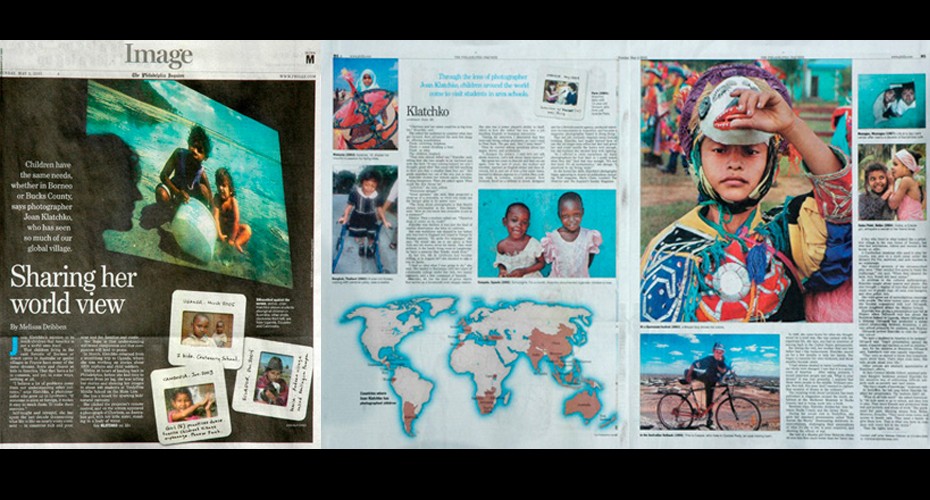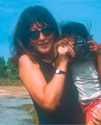SHARING HER WORLD VIEWPhiladelphia Inquirer ….(her) mission is to teach children that America is not a world unto itself. That children living in the rain forests of Borneo or desert caves in Australia or quaint villages in France have many of the same dreams, fears and chores as kids in America. That they have a lot in common, and yet, in some ways, nothing at all.“I believe a lot of problems come from not understanding other cultures,” says Klatchko, a photojournalist…. “If someone is alien or foreign, it makes it easy to mock them.To make them enemies.”Self-taught and intrepid, she has spent the last decade documenting what life is like on nearly every continent – in countries rich and poor, near and far, familiar and exotic. In March, Klatchko returned from a month long trip to Uganda, where she was working on stories about AIDs orphans and child soldiers.Within 36 hours of landing back in Philadelphia, before she had time to recover from jet lag, she was telling her stories and showing her images to about 100 students at Tredyffrin Middle School on the Main Line.Her hope is that understanding will breed compassion and that compassion will lead to peace.She has a knack for sparking kids’ natural curiosity…She clicked the projector’s remote control, and on the screen appeared a photograph of Charleen, an Australian girl, with her little sister, standing in a body of water.“Charleen and her sister could be in big trouble,” Klatchko said. She asked the audience to consider what danger loomed, then advanced the next few images, offering possibilities.Flash: cavorting dolphins. “The thing about photographs is that there’s always information in the details,” Klatchko said. “How do you know this crocodile is not in a museum?” Silence. Then a student called out, “There’s a drop of water on its tooth!” Her own worldview was shaped by her father, who was born in England and raised in Vienna by Russian parents. “He spoke five languages,” she says. “He would take me to see opera in New York’….. Klatchko, 48, has the kind of gutsy charm that serves as a hovercraft over choppy waters. She also has a poker player’s ability to bluff, which is how she talked her way into a job teaching English to business executives…… (years later) and became a magazine photographer based in Hong Kong. |
This last job normally requires some formal training. Klatchko had taught herself how to use the old single-lens reflex her dad had given her and could handle the basics well enough, but she realized she needed help with lighting.“So I offered to carry equipment for some photographers for four days so I could watch what they did.” And that was enough. “It’s not that hard. It’s all mathematics,” she shrugs. “I practiced in my living room.”As she honed her skills, Klatchko’s photographs began appearing in dozens of publications including Time magazine, The Observer in the UK, Marie Claire and The Philadelphia Inquirer’s Sunday Magazine…… ….During her recent visit to Tredyffrin, she gave her standard presentation called “Kids Across the World,” illuminating children’s resourcefulness, challenging their assumptions of what it’s like to live in poor countries, and showing the effects of war.She told of a Muslim girl from Malaysia whose 50-cent kite flew much better than her fancy one. A boy who lived in what looked like a primitive village in the rainforest of Borneo, but who had televisions, videos and stereos in his house on stilts.A Cambodian musician who used to play for royalty, was sent to a work camp under the dictator Pol Pot, survived, and now teaches in an orphanage.She showed pictures of the circumscribed play area. “They needed five acres to build the orphanage,” she said. “When they cleared the land, they found 500 land mines.”In addition to the cultural anthropology, Klatchko taught about insects and plants. She also brought a display of toys that children had made out of plastic jugs, oil cans, coat hangers, and shoe polish tins………..At Bala Cynwyd Middle School, assistant principal Margery Andersen praised Klatchko for her sensitive way of addressing difficult subjects such as poverty and land mines. “She has a wealth of knowledge,” Andersen said.At Tredyffrin, the bell rang before Klatchko finished her presentation. The students didn’t stir. “What do all kids need?” she asked rhetorically. “All kids need to go to school, and they love to play. They need friends and protection from war and poverty and abuse of work.” She quickened her pace, showing scenes from Belize, Morocco, Ecuador. “They need clean water and access to health care. They need a family to give them love. That is what you have in common with every kid in the world.”Then the lights went on. |
Press
SHARING HER WORLD VIEW


